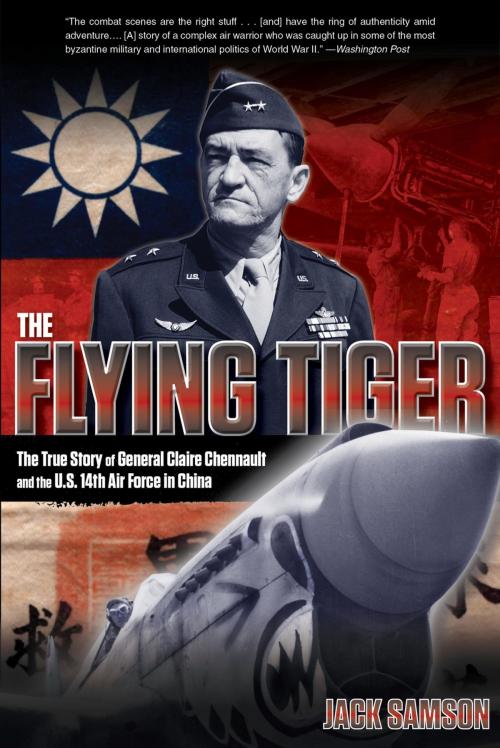Flying Tiger
The True Story of General Claire Chennault and the U.S. 14th Air Force in China
Nonfiction, History, Military, World War II| Author: | Jack Samson | ISBN: | 9780762795437 |
| Publisher: | Lyons Press | Publication: | December 20, 2011 |
| Imprint: | Lyons Press | Language: | English |
| Author: | Jack Samson |
| ISBN: | 9780762795437 |
| Publisher: | Lyons Press |
| Publication: | December 20, 2011 |
| Imprint: | Lyons Press |
| Language: | English |
The Flying Tigers and the U.S. Fourteenth will be the subject of a huge upcoming film from IMAX and director John Woo. The film is scheduled to start shooting in spring 2011 with no firm release date stated yet. The role of Chenault in the film is likely to be the role of a lifetime for a huge star.
When a sickly, half-deaf, forty-seven-year-old retired U.S. Army Air Corps Captain went to China in 1937 to survey Chiang Kai-shek’s Chinese Air Force, little did the world know this would be the man to stem the Japanese tide in the Far East. Almost every military expert predicted his handful of pilots of the American Volunteer Group would not last three weeks. Yet in seven months in 1942, the AVG, fighting a rear-guard action over Burma, China, Thailand, and French Indonesia, destroyed a confirmed 199 planes, with another 153 “probables” as well. They did this losing only four pilots and twelve P-40s in air combat and sixty-one on the ground.
In this definitive biography of General Claire Chennault, veteran reporter Jack Samson offers a rare and fascinating inside look at this legendary man behind the Flying Tigers.
Unlike Eisenhower and MacArthur, Chennault was no saintly military leader. He was a chain-smoking, bourbon-drinking, womanizing man. He was the kind of leader his men knew could and did fly better than they--in any kind of plane. But first and last, he was a fighter--a tough, single-minded warrior who was never confused by who the enemy was in Asia, regardless of what the State Department thought.
Following Chennault from this command of the Fourteenth U.S. Army Air Force during World War II to the part of his life that is not well known--the intriguing postwar years in China and Formosa, where his Civilian Air Transport (CAT) became the scourge of the Red Chinese--The Flying Tiger is an extraordinary portrait of one of America’s great military commanders.
The Flying Tigers and the U.S. Fourteenth will be the subject of a huge upcoming film from IMAX and director John Woo. The film is scheduled to start shooting in spring 2011 with no firm release date stated yet. The role of Chenault in the film is likely to be the role of a lifetime for a huge star.
When a sickly, half-deaf, forty-seven-year-old retired U.S. Army Air Corps Captain went to China in 1937 to survey Chiang Kai-shek’s Chinese Air Force, little did the world know this would be the man to stem the Japanese tide in the Far East. Almost every military expert predicted his handful of pilots of the American Volunteer Group would not last three weeks. Yet in seven months in 1942, the AVG, fighting a rear-guard action over Burma, China, Thailand, and French Indonesia, destroyed a confirmed 199 planes, with another 153 “probables” as well. They did this losing only four pilots and twelve P-40s in air combat and sixty-one on the ground.
In this definitive biography of General Claire Chennault, veteran reporter Jack Samson offers a rare and fascinating inside look at this legendary man behind the Flying Tigers.
Unlike Eisenhower and MacArthur, Chennault was no saintly military leader. He was a chain-smoking, bourbon-drinking, womanizing man. He was the kind of leader his men knew could and did fly better than they--in any kind of plane. But first and last, he was a fighter--a tough, single-minded warrior who was never confused by who the enemy was in Asia, regardless of what the State Department thought.
Following Chennault from this command of the Fourteenth U.S. Army Air Force during World War II to the part of his life that is not well known--the intriguing postwar years in China and Formosa, where his Civilian Air Transport (CAT) became the scourge of the Red Chinese--The Flying Tiger is an extraordinary portrait of one of America’s great military commanders.















